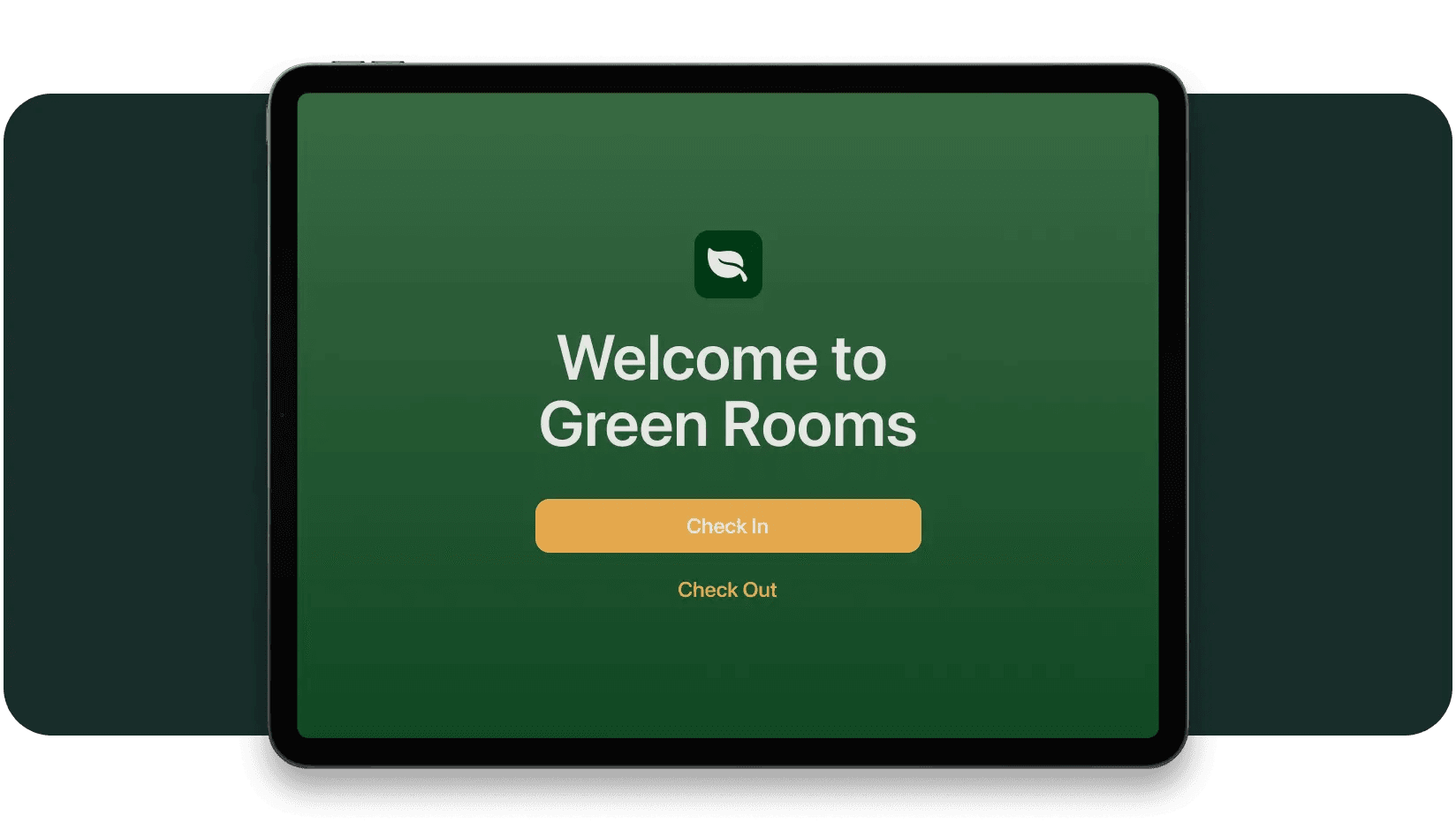- Features
- Solutions
- Pricing
- Resources
- Contact
- Book a demo

Coworking spaces are the perfect solution for so many. Individuals who have normally worked in the isolation of their homes can now share space with other like-minded professionals, share ideas and enjoy a bit of social interaction; entrepreneurs not ready to go the cost of regular office space have a reasonable alternative and a meeting place for conducting business; business travelers have an attractive space to work, outside of the isolation and cramped space of hotel rooms.
Among all of the many benefits that coworking space owners offer, there are also some responsibilities. One of these is a visitor or guest policy, for both their protection and the protection of their co-space customers. After all, an open-door policy can wreak havoc on the atmosphere of the space, frustrate renters, and hurt the professional reputation of an owner.
Clearly, a policy for visitors and guests must be drafted, distributed to all, and fully enforced, even in the absence of the space owner. To craft such a policy, along with its implementation, will take some serious thought so that all eventualities are covered. It’s easy to leave important provisions out and then have to go back with revisions, which no one wants to do.
Pro Tip: Remember that paper rules, terms, and contracts are a thing of the past. These days, modern flexible workspaces use digital consent right in the apps. For instance, on Spacebring new members must accept your Privacy Policy & Terms of Use upon signing up. By going digital with your visitor policy, you not only go green but save admins from extra work and make it easier for the customers to get acquainted and agree with your rules.
Based upon the very best visitor and guest policies that other coworking space owners have devised, here are all of the provisions you will need to include in your own.
1. Limitations on Guests for Each Member
There are a variety of needs that coworking space users have. Some need a quiet environment where they can focus on the work at hand; others may be collaborating with others in the same space. Etiquette requires that a variety of needs be met. Bringing in guests can mar the business and professional atmosphere of the space.
Here are the details of the provision for guests:
- How many guests may an individual space renter have at any one time?
- If a member brings in guests, what are the spaces available for them to meet? These should be outside of the main working space where others may need quiet.
- How will you keep track of the guests that visit? You will want some type of sign-in procedure so that you know the number limitation is not being violated and so that anyone entering the building is un-invited. This is a security consideration.
- How will guests enter the building? Many coworking space owners provide their customers with a key card, much like those used by hotels. At no time should a member give his key card to anyone else. If they are expecting guests, then it is their responsibility to physically let the guest(s) in, unless you have a manager or receptionist on duty. In this case, a member must provide the names of guests and their approximate time of arrival.
- Are there exceptions to limitations? Yes. If, for example, you have a limitation of two guests per member, you must provide for exceptions. For example, a member may need to host a meeting involving more than two guests. How do they reserve this larger number and an appropriate space for their meetings?
- All members and all visitors/guests must be provided a copy of your policies. And you want to be certain that they read and understand the provisions. When members register, they will establish an account with you. During that process, they should be presented with your policy document and check that they have read and understood its provisions before the membership is allowed.
- If temporary guests register for use of your facilities, then they, too, must register, be presented with the policy document, and, again, check off that they have read and understood the provisions, before being given access.
2. Who Has Authority to Admit Guests?
If you have a manager or receptionist on-site, then they have the authority to admit guests, maintain the sign-in book, etc. If, on the other hand, you do not have such a person on-site (e.g., after normal business hours), then members will be responsible for admitting their guests.
In either case, a guest sign-in book/tablet must be available around the clock, so that names and check-in and check-out times are recorded.
Security cameras will supplement this policy and its enforcement.
3. Make Check-In Mandatory

There is no option here. You must know what is going on in your space at all times, and members must be comfortable that you are keeping their space, safe, secure, and professional.
Here is where suitable software can come into play. That software can be used for members to designate guests, time of arrival, etc. It can also serve to cut off “reservations” for guests, should you have a total limit on guests at any one time. Check-in, when there is no manager or receptionist, can also occur via this software, as well as check-out, on a computer located inside the entrance. The beauty of such software is that an owner has a permanent record of all guest visits, times, purposes, etc.
Many coworking space owners allow guests to reserve temporary space when they are not in any way related to current members. Such is often the case with business travelers. There must be a method by which such guests can reserve space for a specific period and how they will enter and sign in and out. Using software for these reservations will ensure that there are never double-bookings or guest numbers that exceed your maximum amounts.
Discover how hundreds of spaces worldwide unlock success and grow better with Spacebring
4. Specify Room Access
Depending upon the number of guests to be housed, you will need to specify which rooms are available and must be used. A guest of a member, for example, will be housed, with that member, in a small meeting room that will accommodate the two of them. Guests of members for a larger meeting will require larger conference-type rooms. And guests who need workspace just for themselves might be housed in the general large workroom.
5. Specify Amenities
You likely have drinks and coffee/tea available for your members. And you may want to make them available to guests as well, on a limited basis.
Guests of members might have unlimited amounts of coffee/tea, for example, but not for additional drinks and/or snacks, unless the member is willing to pay for them.
Guests who have reserved coworking space and time need to know which amenities are offered to them—drinks, complimentary snacks, and, of course, Wi-Fi access, as well as the use of your hardware. Guests should know these specifications before reserving their space. If you have these policies in writing, it will be easy to post them on your website so that potential guests can make decisions about the use of your space.
6. Fees Must be Specific and Clearly Outlined
This is a critical feature of your visitor/guest policy. Temporary guests need to know exactly how much they will be paying for their space and amenities. Members need to know additional fees if any when their invited guests come into the space and make use of amenities. Spell these out specifically and clearly, so there is no confusion.
It will be important to anticipate what additional amenities guests might access, in addition to those already paid for and those that are offered for free, and to assign fees for each of them.
Many coworking space owners require that guests who contact any of their spaces establish an account, attach a bank card to it, and make payment through that account. In this way, additional charges can be placed on that account.
7. State the Rules of Etiquette
Any policy document that will be distributed to members and guests must include the basic etiquette that is required as they use your space. These are common-sense rules that most will follow anyway, but they still must be put into writing, if only as reminders.
Here are a few examples:
- Disrespecting the privacy of others. For example, standing too close to other individuals as they are working on computer stations or speaking on the phone should not occur.
- Creating noise in common work areas that may disturb or distract others at work.
- Leaving trash, no matter how tiny, around any of the space areas.
- Leaving personal food items in the refrigerator and on counters of common eating areas.
8. Responsibilities of Members Who Host Guests
It will be important for members to know that they are responsible for the behavior of their guests. This is especially important because your staff (e.g., a manager) will not be able to monitor all activity in all spaces. A member may host a multi-guest meeting in a conference room, for example, and that member must accept responsibility for the cleanliness of the room following the meeting; if a guest is with a member in a common workspace, then the rules of etiquette apply. Again, the member is responsible for guaranteeing that any guest follows those rules.
There can be fines attached to members’ guests violating any provisions of your policy or membership termination if the violations are flagrant.
Putting It All Together
You know what you want to put in your policy agreement. And, in actuality, it is a legal document to which your members and guests agree to be bound.
This puts a great onus on you as you write your policy document, and you may want to consider finding writing experts who will ensure that all provisions are clear, perfectly written, and not in any way ambiguous. Just as students often say, “Write my paper for me” to professional writers, so should you do the same. Even if you fashion yourself a writing expert, at least hire writer for a grammar check.
One Final Note—Find the Balance
You need policies for members and any visitors/guests who will be using your space. These guarantee a good and secure working environment for all. And you do need consequences when those policies are violated. At the same time, you want to be inviting and welcoming to new members. If your policy document is too stiff and “negative,” you may lose potential members and guests. You can be casual in tone and style and still very clear, and you can state provisions in positive terms (“do” instead of “don’t). Have a trusted colleague review your policy for that balance.
The article was written by Jessica Fender, a copywriter and blogger at Writeload with a background in marketing and sales. She enjoys sharing her experience with like-minded professionals who aim to provide customers with high-quality services.
Keep Reading

The Operator's Manual for Women-Forward Coworking Spaces

Dog-friendly Coworking Spaces: Pros, Cons & Concerns

Coworking in the Countryside: Top 7 Destinations for Workations & Digital Nomads

